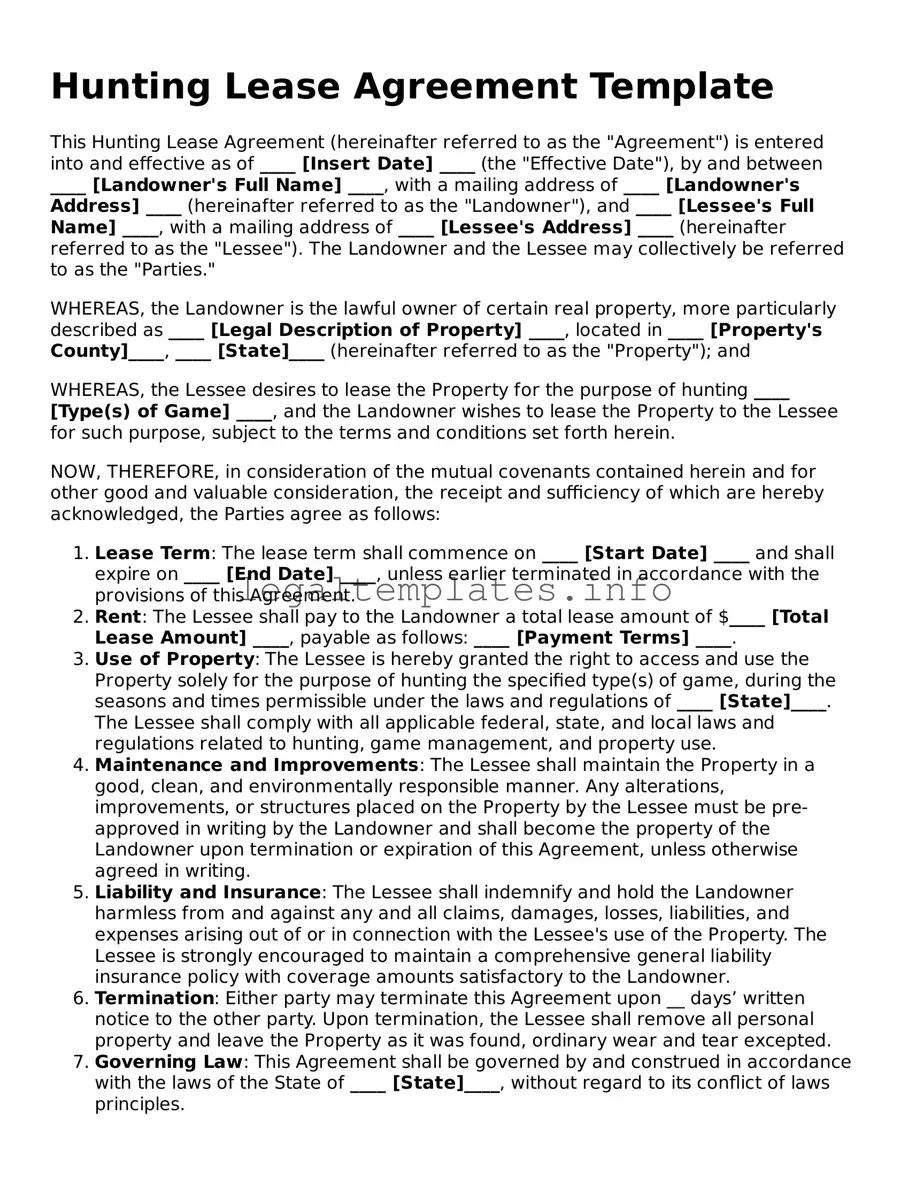What is a Hunting Lease Agreement?
A Hunting Lease Agreement is a legally binding contract between the owner of a property and a hunter or group of hunters, granting them permission to hunt on the property for a specified period of time in exchange for payment. This agreement outlines the rights and responsibilities of both parties, including the specific areas where hunting is allowed, the types of game that can be hunted, and any restrictions or rules that must be followed.
Why do I need a Hunting Lease Agreement?
Having a Hunting Lease Agreement in place is crucial for several reasons. It ensures that both the landowner and the hunters have a clear understanding of the terms and conditions of the hunt, helps prevent potential misunderstandings or disputes, and provides legal protection for both parties. For landowners, it can be a source of income and a way to manage wildlife populations on their property. For hunters, it offers a guaranteed opportunity to hunt in a designated area.
What should be included in a Hunting Lease Agreement?
A comprehensive Hunting Lease Agreement should include the names and contact information of the landowner and the hunters, a description of the leased property, the duration of the lease, the amount and conditions of payment, hunting rights granted, any species or areas excluded from hunting, rules and regulations to be followed, insurance requirements, and clauses related to liability and indemnification. It's also advisable to include a clause on dispute resolution.
How much does it cost to enter into a Hunting Lease Agreement?
The cost of a Hunting Lease Agreement can vary widely based on factors such as the location and size of the property, the abundance and type of game available, the duration of the lease, and any additional amenities or services provided by the landowner. Prices are usually negotiated between the landowner and the hunters and may be structured as a flat fee, a per hunter fee, or based on other terms agreed upon.
Is a Hunting Lease Agreement legally binding?
Yes, a Hunting Lease Agreement is a legally binding contract once it is signed by both the landowner and the hunters. This means that both parties are legally obligated to adhere to the terms and conditions outlined in the agreement. Failure to do so could result in legal consequences, including financial penalties or termination of hunting privileges.
Can I terminate a Hunting Lease Agreement early?
Whether a Hunting Lease Agreement can be terminated early depends on the terms outlined in the contract. Typically, agreements include provisions for early termination under certain conditions, such as breach of contract by either party, natural disasters, or other significant events that render the property unsuitable for hunting. It's important that these clauses are clearly stated in the agreement.
Do I need insurance to enter into a Hunting Lease Agreement?
Landowners often require hunters to carry liability insurance as part of the Hunting Lease Agreement. This insurance protects both the landowner and the hunters in case of accidents or injuries that occur on the property during the lease period. The specific requirements for insurance should be detailed in the agreement, including the minimum amount of coverage and proof of insurance provided to the landowner.
How do disputes over a Hunting Lease Agreement get resolved?
Dispute resolution clauses are typically included in Hunting Lease Agreements to outline the process for resolving any disagreements that arise. This may involve mediation, arbitration, or legal action, depending on the severity of the dispute and the terms agreed upon by both parties. Including a clear dispute resolution process in the contract helps ensure that any issues can be addressed and resolved in a timely and fair manner.
Can I change the terms of a Hunting Lease Agreement after it is signed?
Once a Hunting Lease Agreement is signed, the terms and conditions are considered legally binding and cannot be changed unless both parties agree to the amendments in writing. Any changes to the agreement should be documented as an addendum to the original contract and signed by both the landowner and the hunters to ensure that the modifications are enforceable.
Where can I find a template for a Hunting Lease Agreement?
Templates for Hunting Lease Agreements can be found online through legal services websites, wildlife conservation organizations, or hunting associations. It's important to choose a template that is specific to the laws and regulations of the state where the property is located. However, it's also advisable to have any agreement reviewed by a legal professional to ensure that it adequately protects your rights and interests.

